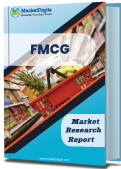
Plant-Based Meat Market By Source (Soy, Wheat, Blends, Pea, Other), Products (Tofu, Tempeh, Seitan, Others), (Distribution Channel (Online, Offline) - Partner & Customer Ecosystem (Product Services, Proposition & Key Features) Competitive Index & Regional Footprints by MarketDigits - Forecast 2024-2032
Industry : FMCG | Pages : 188 Pages | Published On : Mar 2024
The plant-based meat market refers to the industry segment that focuses on producing food products designed to replicate the taste, texture, and nutritional profile of traditional animal-based meat products, while being entirely sourced from plant-based ingredients. These products are often created using a combination of proteins, fibers, fats, and other plant-derived ingredients to mimic the sensory experience of consuming meat, without using any animal-derived ingredients.
Plant-based meat products aim to provide consumers with alternatives that align with their dietary preferences, health concerns, and ethical considerations. These products offer a sustainable and environmentally friendly option, as they generally require fewer natural resources, produce fewer greenhouse gas emissions, and have a reduced impact on land and water resources compared to traditional meat production.
The market growth is driven by the increasing consumer interest in plant-based diets and the rising awareness for animal rights. However, some plant-based meat companies such as Beyond Meat and Impossible Foods saw a drop in demand in 2022, mainly because of the high prices of their products. Plant-based meat is an important part of a vegan diet, which avoids animal-based foods for health and ethical reasons. Some consumers also choose vegetarian ingredients to prevent animal cruelty and consume sustainable food & beverage products. Soy, which is a common raw material for plant-based meat, has all the essential amino acids for human growth. It also improves the water absorption, solubility, emulsification, viscosity, anti-oxidation, and texture of the final product. These factors are expected to increase the demand for soy in plant-based meat products in the coming years.
Major Players In Plant-Based Meat Market Include: Kellogg Company (US), Beyond Meat (US), Maple Leaf Foods (Canada), Impossible Foods Inc. (US), Conagra Foods (US), Unilever (UK), Sunfed (New Zealand), Tofurky (US), Planterra Foods (US), Monde Nissin (Philippines), Alpha Foods (US), Fazendo Futuro (Brazil), Before the Butcher (US), Foods (Argentina), VBites Foods Ltd. (UK)
The plant-based meat market is expanding with different types of products, such as plant-based chicken, pork, and seafood, in addition to plant-based beef. The refrigerated plant-based meat segment is expected to grow rapidly in the forecast period of 2023-2030. This reflects a change in both product innovation and merchandising strategies across the plant-based industry.
The COVID-19 outbreak affected the food supply chain, causing disruptions in the supplies of key inputs, access to production spaces, and distribution of products. Despite these challenges, plant-based companies adapted and continued to launch new products and grow sales. Trade restrictions due to Covid-19 led to disruptions in the food supply chain. Foodservice channel distribution was severely impacted, and retail sales increased sharply due to pantry stocking and panic buying. Many plant-based meat categories saw exponential growth during the initial pantry-stocking period. The COVID-19 pandemic, which resulted in lockdowns, encouraged consumers to order goods online. This is expected to motivate the distributors to move towards online retailing channels.
MARKET DRIVERS
Increasing Awareness About Health And Wellness Awareness
The surge in awareness about health and wellness is a pivotal catalyst propelling the growth of the plant-based market. As consumers become more conscious of the profound impact of diet on their overall well-being, they are actively seeking healthier food choices. Plant[1]based products, often recognized for their lower saturated fat and cholesterol content, resonate with health-conscious preferences. This awareness fuels demand for plant-based meats as individuals perceive them as a nutritionally beneficial alternative to traditional meat.
The connection between plant-based diets and reduced risk of chronic diseases, such as heart disease and diabetes, further incentivizes consumers to embrace plant-based meats. As weight management and personalized health goals gain prominence, the customizable nature of plant-based diets and their potential to contribute to weight-related objectives drives adoption.
Moreover, the wellness industry's expansion, educational resources, and endorsements from health experts amplify the message of health[1]conscious choices. This collective awareness elevates the plant-based market's growth trajectory, creating a symbiotic relationship between informed consumer choices and the flourishing demand for products that align with health and wellness values.
MARKET OPPORTUNITIES
Innovation in Taste and Texture
Innovation in taste and texture is fueling the growth of the plant-based meat market by revolutionizing consumer perceptions. By closely replicating the flavor, juiciness, and mouthfeel of traditional meats, these innovations enhance consumer acceptance and satisfaction. This transformation attracts a wider audience, including meat-eaters seeking healthier and more sustainable choices. The culinary versatility of these improved products allows for seamless integration into various dishes and restaurant menus. Such innovation reshapes the market landscape, propelling repeat purchases, positive word-of-mouth, and sustained market expansion. The delivering products that closely mimic the sensory experience of traditional meats, including their flavor, tenderness, and juiciness, these advancements are reshaping consumer perceptions and preferences. This innovation not only appeals to committed vegetarians and vegans but also captures the attention of flexitarians and meat-eaters looking for healthier and more sustainable options. As plant-based meats become more indistinguishable from their animal-based counterparts, consumers are more inclined to make the switch, leading to increased market demand, broader market penetration, and sustained growth in the plant-based meat industry.
MARKET RESTRAINTS
Competition From Conventional Meats
Competition from conventional meat remains a notable restraint on the growth of the plant-based meat market. The entrenched presence and familiarity of traditional meat products in the global food industry create a challenging landscape for plant-based alternatives. Consumer habits and preferences formed over generations contribute to the resistance in adopting new dietary choices. The perceived quality, taste, and texture of conventional meats continue to be deeply ingrained in consumer perceptions, making it difficult for plant-based meats to replicate the same level of satisfaction.
Furthermore, the accessibility and widespread availability of traditional meat products across various retail outlets, restaurants, and cuisines make them the default option for many consumers. This creates a significant barrier for plant-based meats to compete on convenience. Additionally, cultural significance tied to meat consumption in various societies poses a challenge to the adoption of plant-based alternatives. Convincing consumers to switch from meats that hold cultural importance requires not only overcoming taste and familiarity hurdles but also addressing the emotional and social aspects of food choices. While the plant-based meat market is advancing with innovations, collaborations, and education, the deep-rooted competition from conventional meats remains a formidable challenge to overcome in achieving widespread adoption and market growth.
Major Classifications are as follows:
By Source
- Soy
- Wheat
- Blendss
- Pea
- Other
By Products
- Tofu
- Tempeh
- Seitan
- Others
By Distribution Channel
- Online
- Offline
By Region
- North America
- US
- Canada
- Latin America
- Brazil
- Mexico
- Argentina
- Rest of Latin America
- Europe
- UK
- Germany
- France
- Italy
- Spain
- Russia
- Rest of Europe
- Asia Pacific
- China
- Japan
- India
- South Korea
- Rest of Asia Pacific
- Rest of the World
- Middle East
- UAE
- Saudi Arabia
- Israel
- Rest of the Middle East
- Africa
- South Africa
- Rest of the Middle East & Africa
- Middle East
Reason to purchase this Plant-Based Meat Market Report:
- Determine prospective investment areas based on a detailed trend analysis of the global Plant-Based Meat Market over the next years.
- Gain an in-depth understanding of the underlying factors driving demand for different Plant-Based Meat Market segments in the top spending countries across the world and identify the opportunities each offers.
- Strengthen your understanding of the market in terms of demand drivers, industry trends, and the latest technological developments, among others.
- Identify the major channels that are driving the global Plant-Based Meat Market, providing a clear picture of future opportunities that can be tapped, resulting in revenue expansion.
- Channelize resources by focusing on the ongoing programs that are being undertaken by the different countries within the global Plant-Based Meat Market.
- Make correct business decisions based on a thorough analysis of the total competitive landscape of the sector with detailed profiles of the top Plant-Based Meat Market providers worldwide, including information about their products, alliances, recent contract wins, and financial analysis wherever available.
TOC
Table and Figures
Methodology:
At MarketDigits, we take immense pride in our 360° Research Methodology, which serves as the cornerstone of our research process. It represents a rigorous and comprehensive approach that goes beyond traditional methods to provide a holistic understanding of industry dynamics.
This methodology is built upon the integration of all seven research methodologies developed by MarketDigits, a renowned global research and consulting firm. By leveraging the collective strength of these methodologies, we are able to deliver a 360° view of the challenges, trends, and issues impacting your industry.
The first step of our 360° Research Methodology™ involves conducting extensive primary research, which involves gathering first-hand information through interviews, surveys, and interactions with industry experts, key stakeholders, and market participants. This approach enables us to gather valuable insights and perspectives directly from the source.
Secondary research is another crucial component of our methodology. It involves a deep dive into various data sources, including industry reports, market databases, scholarly articles, and regulatory documents. This helps us gather a wide range of information, validate findings, and provide a comprehensive understanding of the industry landscape.
Furthermore, our methodology incorporates technology-based research techniques, such as data mining, text analytics, and predictive modelling, to uncover hidden patterns, correlations, and trends within the data. This data-driven approach enhances the accuracy and reliability of our analysis, enabling us to make informed and actionable recommendations.
In addition, our analysts bring their industry expertise and domain knowledge to bear on the research process. Their deep understanding of market dynamics, emerging trends, and future prospects allows for insightful interpretation of the data and identification of strategic opportunities.
To ensure the highest level of quality and reliability, our research process undergoes rigorous validation and verification. This includes cross-referencing and triangulation of data from multiple sources, as well as peer reviews and expert consultations.
The result of our 360° Research Methodology is a comprehensive and robust research report that empowers you to make well-informed business decisions. It provides a panoramic view of the industry landscape, helping you navigate challenges, seize opportunities, and stay ahead of the competition.
In summary, our 360° Research Methodology is designed to provide you with a deep understanding of your industry by integrating various research techniques, industry expertise, and data-driven analysis. It ensures that every business decision you make is based on a well-triangulated and comprehensive research experience.
• Product Planning Strategy
• New Product Stratergy
• Expanded Research Scope
• Comprehensive Research
• Strategic Consulting
• Provocative and pragmatic
• Accelerate Revenue & Growth
• Evaluate the competitive landscape
• Optimize your partner network
• Analyzing industries
• Mapping trends
• Strategizing growth
• Implementing plans
Covered Key Topics
Growth Opportunities
Market Growth Drivers
Leading Market Players
Company Market Share
Market Size and Growth Rate
Market Trend and Technological
Research Assistance
We will be happy to help you find what you need. Please call us or write to us:
+1 510-730-3200 (USA Number)
Email: sales@marketdigits.com







